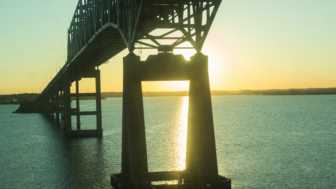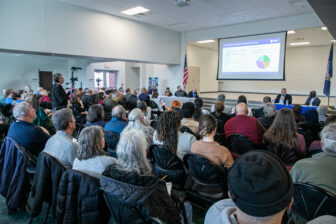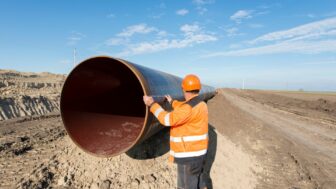Analysis indicates 165,000 Baltimore residents live within the potential oil train blast zone
City Council urged to place a moratorium on permits for crude oil shipping terminals
BALTIMORE—Over 70 concerned citizens gathered outside City Hall and packed a hearing room on Wednesday evening to protest the growing public safety and environmental dangers of potentially explosive oil trains moving through Baltimore. The rally preceded the Baltimore City Council’s first informational public hearing on the issue, and was organized as part of the “Stop Oil Trains” week of action uniting dozens of cities across North America. This week marks the two-year anniversary of the worst oil train derailment and explosion in North America, in Lac-Mégantic, Quebec.
Oil companies are increasingly targeting Baltimore as a gateway for shipping crude oil to East Coast refineries. In recent years, the industry has used trains to move millions of gallons of highly toxic and flammable Bakken crude oil to and through Baltimore—past homes, schools, churches, hospitals, and likely the Inner Harbor—and over tracks that were never designed for this dangerous cargo.
The nonprofit organization ForestEthics calculates that 165,000 Baltimore residents—and City Hall itself—are within the potential oil train “blast zone,” the one-mile evacuation zone recommended by safety officials in the case of a derailment and fire.
“It’s clear that a crude oil train derailment in densely populated areas like Baltimore City could lead to a disastrous loss of life and property,” said Delegate Clarence Lam, MD, MPH (District 12—Howard and Baltimore Counties), who spoke at the rally and also testified before the City Council. “Communities should be informed about the potential dangers they face, and reasonable steps undertaken to reduce the risk to residents living nearby.”
To underscore those risks, rally-goers assembled a replica “oil train” marked with the dates and sites of accidents that have occurred across North America, including the tragedy in Lac-Mégantic, which killed 47 people.
Speakers called on city and state leaders to act now to protect local rail communities. Specifically, the City Council could place a moratorium on approving permits for crude oil shipping terminals until local emergency management, health and safety officials study the associated dangers. Vancouver, WA, and Albany, NY, have already enacted similar city moratoria on permits for crude oil shipping facilities.
“The City Council has taken an important first step to shed light on the risks of oil trains,” said Mike Tidwell, director of the Chesapeake Climate Action Network. “A city moratorium on permits is the sensible next step. If we want fewer code-red air days and less extreme weather, we cannot allow oil companies to use Baltimore as a gateway for extremely toxic, explosive, and climate-disrupting oil.”
During the 2015 legislative session, Delegate Lam introduced a state bill that would have required rail companies to disclose the route, frequency and volume of crude oil being transported by rail through Maryland. CSX and Norfolk Southern have sued the state to prevent the public release of this information. Neither company sent representatives to the City Council hearing.
“Oil trains put the lives of hundreds of thousands of Baltimoreans at risk, including me, my family, and my neighbors, all for the benefit of dirty energy,” said Pastor Amy Sens, a pastor at six:eight United Church of Christ who lives near train tracks in Morrell Park. “Oil trains are an equal opportunity danger, and one we ignore to our peril.”
“Baltimore does not need another environmental injustice that lets ‘Big Oil’ use our city as a throughway to East Coast refineries,” said Will Fadely, Baltimore Program Organizer at Clean Water Action. “Oil trains put our water at risk of spills of oil and other toxic chemicals, and will run right through the heart of the most vulnerable communities in the city. The environmental, community health, and safety impacts far outweigh any benefits.”
“Oil trains don’t have to explode to be dangerous,” said Trisha Sheehan, Regional Field Director at Moms Clean Air Force. “They leak toxic chemicals, endangering everyone’s lungs, especially those most vulnerable to air pollution—our children.”
Wednesday’s rally in Baltimore was organized by the Chesapeake Climate Action Network, Clean Water Action, and the Maryland Environmental Health Network.
It coincided with over 80 events planned across North America during the week of July 6th to draw attention to the growing threat oil trains pose to our health, safety, and climate. Organizers of this week of action are demanding a federal ban on dangerous oil trains.
Reporting by the Baltimore Sun shows that the oil industry has used the Fairfield Peninsula in South Baltimore to unload and ship over 100 million gallons of crude oil over 2013 and 2014, up from zero gallons the previous two years. In addition to bringing significant safety dangers, oil trains threaten to worsen air quality in communities like South Baltimore, where residents already breathe in some of the dirtiest air in Maryland.
Nationally, oil train traffic has grown by 4,000 percent in the past six years, due to the rapid increase in fracking for oil in the Bakken shale fields of North Dakota and in tar sands oil extraction in Canada. The oil moving by train—which represents a small percentage of overall U.S. oil consumption—is more volatile and flammable than conventional oil. Five derailments and explosions occurred in North America in the first five months of 2015.
RESOURCES FOR JOURNALISTS:
- Chesapeake Climate Action Network fact sheet on the issue of oil trains in Baltimore: http://chesapeakeclimate.org/wp-content/uploads/2015/01/Baltimore-Oil-Train-Factsheet-July-2015.pdf
- Maryland Environmental Health Network fact sheet on the public health risks associated with oil trains: https://mdehndotorg.files.wordpress.com/2015/07/mdehn_crudeoilrail_healthfactsheet.pdf
- ForestEthics Oil Train Blast Zone map: Blast-Zone.org. (The calculation that 165,000 Baltimore residents live in the potential blast zone comes from overlaying the map with US Census tract data.)
- Del. Clarence Lam’s July 5, 2015 op-ed in the Baltimore Sun: http://www.baltimoresun.com/news/opinion/oped/bs-ed-oil-tankers-20150704-story.html
Contact:
Kelly Trout, 240-396-2022, kelly@chesapeakeclimate.org
###






